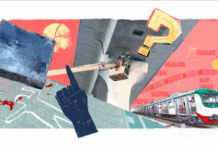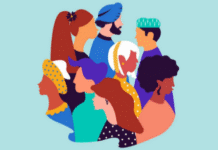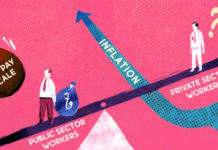“The idea of human rights or justice is not a selective one: Just as we have called out for the justice for the brutal murder of Rajib Haidar, it behooves us to call out for justice for anyone who suffers wrongful death in the hands of the police. In the end this brutal killing of the possible Jamaat-Shibir activist, impede our progress towards real democracy.”
Tibra Ali
While visiting Facebook today I came across a disturbing video posted on a friend’s wall. It shows the clash between the Bangladeshi police and some demonstrators. The video shows two young men, one wearing a blue shirt and the other wearing a red and white shirt, detained and beaten by the police. At some point, the man wearing the blue shirt is let go, while the other man is taken into what looks like an empty store (only a chair is visible). Amidst pleas by this man one of the policemen kicks him down to the ground while another one shoots him on the right side and casually leaves the room. The man is then shown to be wailing, at some point he seems to be calling out for his mother. The video also contains snippets of conversations between the police and some people off the camera arguing about how the demonstrators have been throwing stones at the police. The video ends with what seems like the dead body of the young man in the white and red shirt lying in a pool of blood.
As the day progressed, I couldn’t get the image of the injured boy, whimpering on the ground, crying out for his mother, out of my mind. Although the video isn’t labelled in any clear way, the fact that it showed some demonstrators wearing traditional Bangladeshi Islamic garb (punjabi, payjama and skull caps), it seems to me that the context of this video is a clash between the police and Jamaat-Shibir activists. My friend’s caption, as well as from some of the words that the man was saying (“no bodde, no bodde” – which sounded like “no big brother, no big brother” in the vernacular of Chittagong) seems to suggest that the incident happened in Chittagong. I have no way of determining the veracity of that claim or the fact that this happened in the context of the clash I mentioned above, but for now I shall accept it to be the case.
Over the last few weeks, I have become very enthusiastic about some of the broad aims of the Shahbag movement, as I understand them. More precisely, I feel that as a nation we urgently need to bring secularism and non-communalism into our national life. Not by simply banning this or that political party, but by refusing to use religion as a card in the political game. The problem with communal politics is that it dehumanizes whole blocks of people according to expediency. In this sense communalism is directly opposed to human rights. I oppose the death penalty for anyone. Or even the outright banning of Jamaat-e-Islam, even though I find their ideology backward and their politics repulsive and heinous. We need an open discussion about what should and should not be part of our political life.
Many have called this movement partisan, but in my view it is a movement that is being hijacked by political parties (on all sides) for their own agendas. Those who are calling this movement partisan are missing out on a lifetime’s opportunity in joining an open discussion of what it means to be Bangladeshi. The core movement is about continuing the dream of Bangladesh and not about partisanship. For those who believe that this movement is partisan, it is a classic case of seeing the glass half-empty. You can only create the future of Bangladesh by taking an active part in the present, not by distancing yourself from it by being ensconced in old partisan points of view.
I believe that as a movement, Shahbag must try to address the political culture and the vicious cycles that necessitates the call for the death penalty of the likes of Kader Molla. We need to focus our energies towards developing a political culture where the life-imprisonment of the Butcher of Mirpur would be ensured irrespective of changes in government.
I believe that the movement itself has been peaceful so far. Its call for restraint after the brutal murder of the blogger Rajib Haidar associated with it, the lack of revenge attacks on Islamist by the people congregated at Shahbag, are testaments to that fact. How could this be otherwise, as most of the people involved in it are normal people without affiliation to the armed cadres of any of the political parties?
I have seen a veritable sea of people turning up to attend the Janaza of Rajib Haidar at Shahbag – calling out for the perpetrators of his vicious murder to be brought to justice.
By the same token we need to call out for the justice for the death of this unnamed victim of police brutality. Jamaat is trying to label the Shahbag movement as a movement of atheists. The truth is that it is a movement of people who believe in openness and transparency, people who believe in a future of Bangladesh free from the binary politics of the past. Let us not forget that this movement started as a call for justice for the victims of the mass murders of 1971. In that sense this movement is a yearning for human rights and justice.
The idea of human rights or justice is not a selective one: Just as we have called out for the justice for the brutal murder of Rajib Haidar, it behoves us to call out for justice for anyone who suffers wrongful death in the hands of the police.
In the end this brutal killing of the possible Jamaat-Shibir activist, impede our progress towards real democracy.
Source: Alal O dulal









